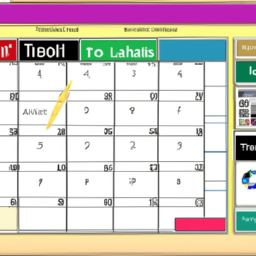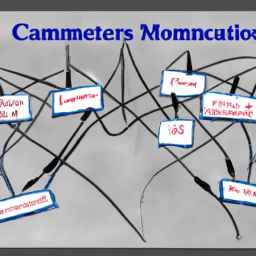Get ready to dive deep into the world of project schedule management techniques. Like a skilled conductor guiding an orchestra, project managers play a crucial role in orchestrating the complex symphony of tasks, deadlines, and resources that make up a successful project.
In this article, we will take a detailed look at the key techniques that will help you master the art of project schedule management.
First, we will define the project objectives and scope, setting the stage for a clear direction and purpose.
Then, we will create a Work Breakdown Structure (WBS), breaking down the project into manageable tasks and subtasks.
With the WBS in place, we will develop a project schedule, carefully sequencing the tasks and allocating resources to ensure a smooth flow of work.
Estimating task durations is the next critical step, as accurate timeframes are essential for effective planning and resource allocation.
We will then explore how to monitor and control the project schedule, keeping a close eye on progress and making adjustments as needed.
Finally, we will discuss how to continuously improve schedule management, learning from past projects and implementing best practices to enhance future performance.
By the end of this article, you will have a comprehensive understanding of project schedule management techniques and be equipped with the tools to drive your projects to success.
So, let’s get started!
Key Takeaways
- Project managers play a crucial role in orchestrating tasks, deadlines, and resources in a project.
- Creating a Work Breakdown Structure (WBS) helps break down the project into manageable tasks.
- Accurate task duration estimation is essential for effective planning and resource allocation.
- Monitoring and controlling the project schedule is important for tracking progress and making adjustments.
Define Project Objectives and Scope
Now that you’ve identified your project objectives and scope, it’s time to dive into the details and start planning out your project schedule. In order to successfully manage your project schedule, it’s crucial to have a clear understanding of your project objectives and scope.
Project objectives define the desired outcomes and deliverables that you aim to achieve, while scope definition outlines the boundaries and limitations of your project. By clearly defining your project objectives and scope, you establish a solid foundation for your project schedule management. This allows you to effectively plan and allocate resources, set realistic timelines, and track progress towards your goals.
Moving forward, the next step is to create a work breakdown structure (WBS), which will further break down your project into manageable tasks and activities.
Create a Work Breakdown Structure (WBS)
To create a Work Breakdown Structure (WBS), you need to break down project tasks into manageable components. This helps you to clearly define and understand the work that needs to be done.
Once tasks are broken down, you can assign resources and durations to each task, ensuring that the project is properly resourced and that deadlines are realistic.
By following this process, you can effectively manage and organize your project tasks, maximizing efficiency and productivity.
Break down project tasks into manageable components
Breaking project tasks into bite-sized pieces is like slicing a complex puzzle into manageable chunks, ensuring a smoother journey towards project success. Task breakdown involves dividing the project into smaller, more manageable components, making it easier to assign resources and durations to each task. This process allows you to identify and prioritize the necessary steps to complete each task, ensuring that nothing is overlooked. Task sequencing is another crucial aspect of project schedule management, as it determines the order in which tasks should be performed. By breaking down project tasks and sequencing them appropriately, you can optimize efficiency and minimize delays. Once the tasks are broken down, the next step is to assign resources and durations to each task, ensuring that the project timeline is realistic and achievable.
Assign resources and durations to each task
Assigning resources and durations to each task ensures that the project progresses smoothly and maximizes productivity. Resource allocation involves identifying and assigning the necessary personnel, equipment, and materials needed to complete each task. This step requires careful consideration of the availability and expertise of team members, as well as any external resources that may be required.
Task estimation involves determining the amount of time needed to complete each task. This includes considering factors such as the complexity of the task, the skills of the assigned personnel, and any potential risks or challenges that may arise. Accurate estimation helps in setting realistic deadlines and allocating resources effectively.
By assigning resources and durations to each task, the project team can better plan and execute the project schedule, ensuring optimal utilization of resources and timely completion of tasks. This lays the foundation for the subsequent section on developing a project schedule.
Develop a Project Schedule
Creating a project schedule is like weaving together the threads of tasks and deadlines, seamlessly blending them into a cohesive timeline. It involves developing milestones and conducting a critical path analysis to identify the sequence of activities that determine the project’s duration.
The first step is to break down the project into smaller tasks and assign resources to each task. Once this is done, you can start developing the project schedule by determining the order in which tasks should be completed and estimating their durations. It’s important to consider dependencies between tasks and any constraints that may impact the schedule.
By carefully analyzing the project requirements, resources, and constraints, you can create a detailed project schedule that outlines when each task will be completed. This will provide a roadmap for the project team and ensure that everyone is aligned on the timeline and deadlines.
Transitioning into the next section, estimating task durations is the next crucial step in project schedule management.
Estimate Task Durations
Once you’ve carefully analyzed the project requirements, resources, and constraints, it’s time to estimate the durations of each task. This ensures you have a realistic and achievable timeline for your project. Estimating task durations is critical for effective project schedule management. It helps you allocate resources effectively and identify potential bottlenecks.
There are various techniques you can use for estimating task durations. Expert judgment involves consulting industry experts or experienced team members for their insights on task durations. Analogous estimating uses historical data from similar projects to estimate durations. Parametric estimating involves using mathematical models or algorithms to calculate durations based on variables like size or complexity. Three-point estimating combines optimistic, pessimistic, and most likely estimates to determine a more accurate duration.
By employing these estimating techniques and incorporating effective time management strategies, you can develop a project schedule that sets you up for success. Moving forward, monitoring and controlling the project schedule ensures that tasks are completed on time and any deviations are addressed promptly.
Monitor and Control Project Schedule
In order to effectively monitor and control project schedule, you need to regularly update and track progress against the schedule. This allows you to have a clear understanding of how the project is progressing and whether or not it’s on track.
If there are any deviations from the schedule, it’s important to implement corrective actions to address them. This can help to ensure that the project stays on schedule and any potential delays or issues are addressed in a timely manner.
Regularly update and track progress against the schedule
To effectively manage a project schedule, it’s essential to consistently update and monitor progress against the plan. This allows you to identify any deviations or delays early on and take appropriate actions to keep the project on track.
Update frequency plays a crucial role in ensuring that the schedule remains accurate and reflective of the project’s progress. Regular updates help you stay informed about the current status and make informed decisions accordingly.
Progress tracking is another key aspect of schedule management. By tracking progress against the schedule, you can determine if tasks are being completed as planned or if there are any delays. This information is valuable for identifying potential bottlenecks and allocating resources effectively.
By regularly updating and tracking progress, you can proactively address any schedule deviations and take corrective actions to keep the project on schedule.
Implement corrective actions to address schedule deviations
Now that you’ve regularly updated and tracked progress against the schedule, it’s crucial to implement corrective actions to address any schedule deviations. By doing so, you can ensure that the project stays on track and meets its deadlines.
Implementing process improvements is an effective way to address these deviations. This involves analyzing schedule variances and identifying the root causes of the delays or deviations. Once you’ve identified the causes, you can take appropriate corrective actions, such as reallocating resources, adjusting timelines, or re-prioritizing tasks.
By actively addressing schedule deviations, you can minimize their impact on the project and prevent further delays. This proactive approach will enable you to continuously improve schedule management and ensure the successful completion of the project.
Now, let’s delve into how to continuously improve schedule management.
Continuously Improve Schedule Management
Improve your schedule management continuously by implementing effective techniques and strategies. Continuous improvement is key to ensuring that your project stays on track and meets its deadlines.
One important aspect of schedule management is time management. By effectively managing your time, you can ensure that tasks are completed in a timely manner and that the project progresses smoothly.
To continuously improve your schedule management, consider implementing time-saving techniques such as prioritizing tasks, setting realistic deadlines, and using tools and software to track and manage your schedule.
Regularly review and analyze your schedule to identify any areas of improvement or potential deviations. This will allow you to take proactive measures and make necessary adjustments to keep your project on schedule.
By continuously improving your schedule management, you can increase efficiency, productivity, and ultimately the success of your project.
Frequently Asked Questions
How does project schedule management contribute to the overall success of a project?
Project schedule management plays a crucial role in the overall success of a project. By optimizing the project schedule, you can ensure that resources are allocated efficiently and effectively. This helps in achieving project goals within the specified time frame.
Moreover, adhering to the project schedule is of utmost importance as it enables better coordination among team members, minimizes delays, and allows for timely identification and resolution of any potential bottlenecks.
Therefore, project schedule management is essential for project success.
What are some common challenges faced during the development of a project schedule?
When it comes to the development of a project schedule, there are several common challenges that you may face.
First, accurately estimating the time required for each task can be difficult, leading to potential delays.
Additionally, coordinating the schedules of multiple team members can be a logistical challenge.
Lastly, unexpected changes or issues can arise during the development process, requiring adjustments to the schedule.
Overall, effective project schedule management is crucial to navigating these challenges and ensuring successful project completion.
How can project managers ensure that the estimated task durations are realistic and accurate?
To ensure task accuracy, project managers can employ various techniques for estimating durations. One effective approach is to break down complex tasks into smaller, more manageable sub-tasks. By doing so, managers can assign realistic durations to each sub-task based on their complexity and resource requirements.
Additionally, historical data and past project experiences can be analyzed to provide insights into the timeframes needed for similar tasks. These techniques help project managers develop realistic and accurate estimates for task durations.
What are some effective techniques for monitoring and controlling the project schedule?
To effectively monitor and control the project schedule, you can employ various techniques. One effective method is using project management software to track tasks, deadlines, and progress.
Regularly reviewing and updating the project schedule can also help identify any potential issues or delays.
Additionally, holding regular team meetings and communicating with stakeholders can provide valuable insights into the project’s progress.
By implementing these effective monitoring techniques, you can ensure better control over the project schedule and mitigate any potential risks or delays.
How can project managers continuously improve their schedule management techniques to avoid delays and ensure timely completion of projects?
To continuously improve your schedule management techniques and avoid delays, treat your project like a delicate ecosystem, where every element must thrive in harmony.
Continuously evaluate your processes, identify bottlenecks, and implement effective solutions.
Regularly communicate with stakeholders to understand their needs and adjust timelines accordingly.
Embrace technology, such as project management software, to streamline scheduling and enhance collaboration.
By staying vigilant and making incremental improvements, you can ensure timely completion of projects and maintain a proactive approach to schedule management.
Conclusion
In conclusion, project schedule management is the compass that guides your project towards success. It is the thread that weaves together every task, ensuring that your objectives are met and your scope is achieved.
By diligently defining objectives, creating a comprehensive work breakdown structure, and developing a well-thought-out project schedule, you can navigate the intricate maze of tasks and deadlines.
Remember, just like a captain navigating through stormy waters, you must constantly monitor and control the project schedule, making adjustments as necessary.
With a meticulous approach to schedule management, you can sail smoothly towards project triumph.



























